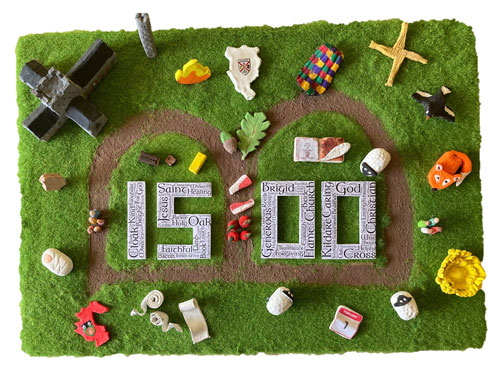Cashel Library will celebrate St. Brigid, with an event taking place on Tuesday morning next, January 30th at 11:00am sharp.
This year 2024 we celebrate over 3,000 years of ‘Brigid the Goddess’, and 1,500 years of ‘Brigid the Saint’, which is what makes her legacy so enduring.
Cashel Librarian, Ms Maura Barrett, will, on Tuesday morning next, cast more light on the St Brigid story.

Pic: G. Willoughby ©.
Dandelion Flower. (Irish: ‘Bearnán Bhríde’).
The Dandelion Flower is long associated with Saint Brigid (known in Irish as ‘Bearnán Bhríde’). It is one of the first blossoms observed after Saint Brigid’s day and it is said that every time you see one in bloom you should think of the bright flame of faith that is Saint Brigid. The flower also signifies that Saint Brigid was one of the first people, thousands of years ago, to draw attention to, and champion biodiversity, through her care of flora and fauna and her knowledge of the environment.
Brigid’s Bird. (Irish: Brìd-eun meaning ‘Brigid’s bird’ or ‘Giolla-Brìghde’ meaning ‘Servant of Bride’).
The bird known as the Oystercatcher is connected to St Brigid of Kildare. Legend states St Brigid was running away from a band of evil men, who wished her dead. Alone and on reaching a beach where there was no place to hide, she said a prayer to God to thank him for her life, before lying on the sand to accept her death. However, before the evil men reached where she lay, Oystercatcher birds scavenging on the shoreline, saw her, and realised her predicament covered her with seaweed, thus hiding her and saving her life. She later is said to have blessed the species and since that day the Oystercatcher bird has been linked to Ireland’s principal female saint.
St Brigid’s Cross. (Irish: Cros Bhríde, Crosóg Bhríde or Bogha Bhríde)
A St Brigid’s Cross is correctly and traditionally made with just 7 strands of the widely distributed soft field rush (Juncus effusus) representing 7 days in the week. (In modern times, same can be woven from straw; rushes; drinking straws, or rolled paper; its construction defined by whatever building materials are available). Four (the four arms of the cross) multiplied by 7 equals 28, latter representing St Brigid’s month, being February, which has 28 days. The middle part of the cross adds up to 29 representing the 29 days in February’s ‘once in 4’ leap year.
The public are invited to please come along to attend this informative lecture, but please remember booking is essential, so please make contact in advance by Telephoning Cashel Library at 062 63825 or 062 63856, to be sure of a seat.
Note: Tea and Coffee will be served.
[ You can locate the Cashel Library building, situated on Friar Street, Lady’s Well, Cashel, Co. Tipperary, HERE. (G487+RX) ].

Leave a Reply